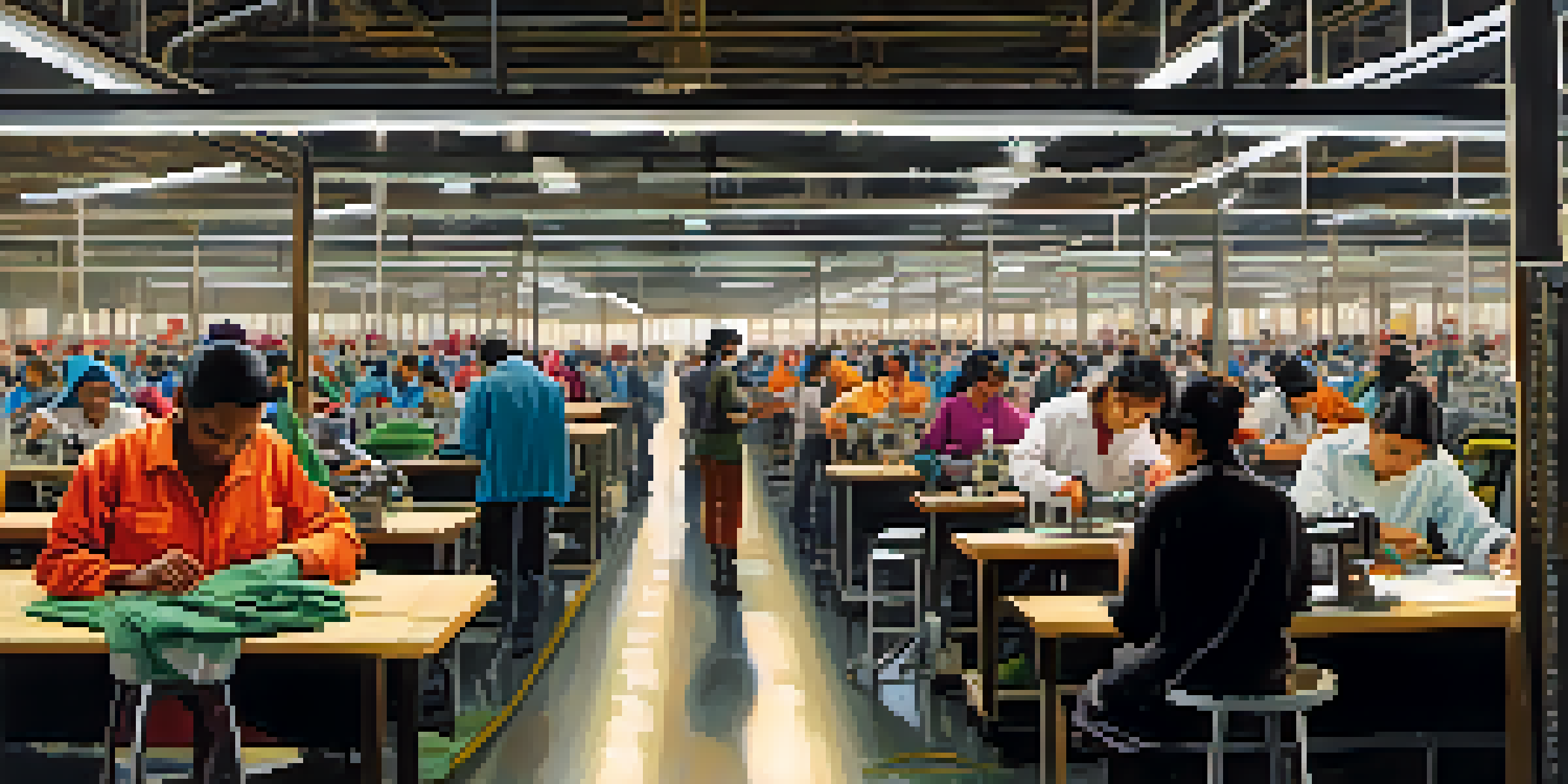Exploring Labor Rights in the Fashion Industry: A Global Overview

Understanding Labor Rights in the Fashion Industry
Labor rights encompass the legal and human rights of workers, ensuring fair treatment, safe working conditions, and the freedom to unionize. In the fashion industry, these rights are often compromised due to the pursuit of low production costs. Workers in developing countries face long hours, low wages, and unsafe environments, raising significant ethical concerns for consumers and brands alike.
Fashion is the armor to survive the reality of everyday life.
The complexity of labor rights in fashion stems from its global supply chain, where production is outsourced to countries with lax regulations. For instance, many garments are manufactured in factories that prioritize profit over worker welfare. Understanding these dynamics is crucial for anyone interested in the ethics of fashion and consumer responsibility.
By fostering awareness and demanding accountability, consumers can play a pivotal role in advocating for labor rights. Brands that prioritize ethical practices not only contribute to fair labor standards but also resonate with a growing demographic of conscious consumers.
Historical Context of Labor Rights in Fashion
To appreciate the current state of labor rights in the fashion industry, it’s essential to look back at its history. The industrial revolution marked a significant turning point, as factories began to spring up and exploit cheap labor, particularly women and children. This era laid the groundwork for labor movements advocating for better working conditions and fair pay.

Throughout the 20th century, various labor laws were enacted, yet many factories, particularly in developing nations, still operate outside these regulations. The struggle for labor rights has been ongoing, with numerous incidents of worker exploitation sparking global outrage. Notable tragedies, such as the Rana Plaza collapse in Bangladesh, highlighted the dire need for reform.
Labor Rights Impact Fashion Ethics
Labor rights are often compromised in the fashion industry due to low production costs, leading to unsafe working conditions for workers.
Understanding this history sheds light on the challenges that persist today. It underscores the importance of international cooperation and advocacy in pushing for sustainable change within the fashion industry.
Current Labor Rights Issues in the Global Fashion Supply Chain
Today, the fashion supply chain is riddled with labor rights issues, including wage theft, forced labor, and lack of job security. Many workers are paid below the minimum wage, and in some cases, they are forced to work overtime without compensation. These practices are not just isolated incidents; they reflect a systemic problem within the industry.
The consumer is not a moron, she is your wife.
For example, reports have surfaced about workers in certain countries being subjected to abusive practices, such as being locked in factories or facing physical threats for not meeting production quotas. Such violations are often hidden from consumers, who remain unaware of the true cost of their clothing. This lack of transparency fuels the cycle of exploitation.
Addressing these issues requires a concerted effort from brands, consumers, and governments alike. By holding companies accountable and demanding transparency, we can advocate for lasting change that prioritizes the dignity and rights of workers.
The Role of Brands in Promoting Labor Rights
Brands play a crucial role in shaping labor rights within the fashion industry. By adopting ethical practices and prioritizing fair labor standards, companies can significantly impact the lives of workers across their supply chains. Many brands are beginning to recognize the value of transparency and sustainability, responding to consumer demands for responsible practices.
For instance, some companies are increasingly investing in audits and certifications to ensure their factories adhere to labor standards. Others are collaborating with non-profit organizations to improve working conditions and provide educational opportunities for workers. This shift toward accountability is a promising step in the right direction.
Brands Must Prioritize Transparency
Brands can significantly improve labor rights by adopting ethical practices and being transparent about their supply chains.
However, genuine commitment is key. Brands must not only implement changes but also communicate their efforts transparently to consumers. This builds trust and reinforces the idea that ethical fashion is not just a trend but a necessary evolution.
Consumer Awareness and Its Impact on Labor Rights
Consumer awareness is a powerful tool in promoting labor rights within the fashion industry. As shoppers become more knowledgeable about the implications of their purchases, they can make informed decisions that align with ethical values. This growing consciousness is influencing brands to adopt more humane practices.
Social media has amplified this movement, allowing consumers to share information and hold brands accountable. Campaigns that expose labor violations can quickly gain traction, prompting companies to respond swiftly to public pressure. The collective voice of informed consumers has become a formidable force for change.
Moreover, when consumers choose to support brands that prioritize ethical labor practices, they send a clear message to the industry. This shift not only encourages better practices but also fosters a market where ethical fashion can thrive.
International Organizations and Labor Rights Advocacy
International organizations play a pivotal role in advocating for labor rights in the fashion industry. Bodies such as the International Labour Organization (ILO) work to promote fair labor standards globally, offering guidelines that countries and companies can adopt. Their efforts help create frameworks for safe and equitable working environments.
In addition to the ILO, numerous NGOs actively campaign for labor rights and provide support to workers facing exploitation. These organizations often conduct research, raise awareness, and lobby for policy changes that protect workers' rights. Their advocacy is crucial in shining a light on injustices that might otherwise go unnoticed.
Consumer Awareness Drives Change
Informed consumers play a crucial role in promoting labor rights by holding brands accountable and supporting ethical practices.
Collaboration between these organizations and the fashion industry can lead to meaningful progress. By working together, they can establish better practices and ensure that labor rights are upheld throughout the supply chain.
Future of Labor Rights in the Fashion Industry
The future of labor rights in the fashion industry hinges on continued advocacy and consumer engagement. As awareness grows, there is hope that more brands will prioritize ethical practices and invest in their workers. The trend towards sustainable and responsible fashion is not just a passing phase but an essential aspect of the industry's evolution.
Innovations in technology, such as blockchain, offer exciting possibilities for enhancing transparency in the supply chain. By tracking the journey of garments from production to sale, consumers can make choices that align with their values. This level of transparency could encourage brands to adhere to higher labor standards.

Ultimately, the collective effort of consumers, brands, and advocacy groups will shape the future of labor rights in fashion. With continued commitment, we can envision an industry where workers are treated with dignity and respect, ensuring a brighter future for all.